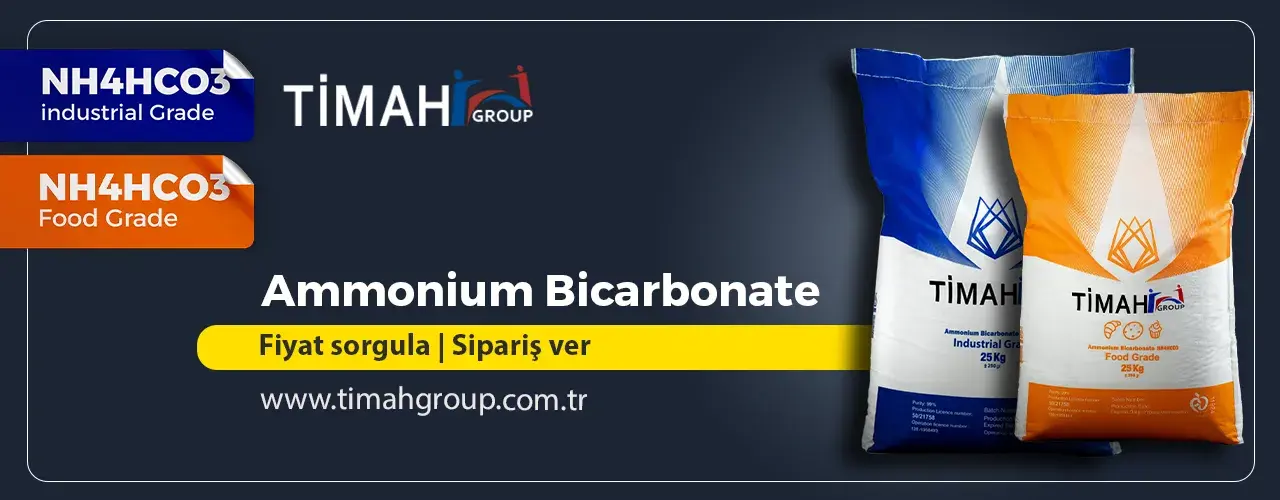What is Ammonium Bicarbonate?
Ammonium bicarbonate, with the chemical formula NH₄HCO₃, is a compound used as an additive to enhance the quality of final products in various industries. It is available in two main grades: industrial (chemical grade) and food grade. It appears as small, white granules or powder and is commonly known as ammonium carbonate or hartshorn. This compound is derived from the reaction between ammonia and carbon dioxide in water, forming a weakly basic bicarbonate salt.
Technical Specifications
- Chemical Name: Ammonium Bicarbonate
- Chemical Formula: NH₄HCO₃
- Melting Point: 35 to 60 degrees Celsius
- Water Solubility: 24.8 g/100 ml water (at 25°C)
- Appearance: White powder
- Grade: Edible, Industrial
Other Names for Ammonium Bicarbonate
Ammonium bicarbonate is known by several names that reflect its long history of use: ammonium hydrogen carbonate, ammonium acid carbonate, monoammonium carbonate, monoammonium salt of carbonic acid, and powder ammonia.
Main Uses of Ammonium Bicarbonate
Food Industry
- Baking Powder Production: Used as a leavening agent, particularly in the production of flat baked goods like cookies and crackers.
Fire Industry
- Fire Extinguishing Compounds: Utilized in the production of fire extinguishing agents.
Other Applications
- Descaling Agent: Used in heat exchangers and boilers.
- Plastics and Rubber Industry: Especially in the production of sponge rubber.
- Plant Fertilizer: Used in agricultural applications as a fertilizer.
- Leather Tanning: Employed in the tanning process in the leather industry.
- Ceramic Production: Used in ceramic manufacturing.
- Catalyst Synthesis: Involved in the synthesis of catalysts.
- Frozen Dairy Products: Utilized in the production of frozen dairy products.
- Pharmaceutical Industry: Used in the production of expectorant cough syrups.
- Fireproof Materials: In the production of fire-resistant materials and special firefighting suits.
Chemical Properties and Applications
- Molecular Weight: 79.06 g/mol
- Solubility: Soluble in water
- Decomposition: When heated, ammonium bicarbonate decomposes, releasing ammonia, water, and carbon dioxide gases.
Food Industry
Traditionally used in baking, particularly in the production of flat baked goods like cookies and crackers, where it reacts with acidic components in the dough to produce carbon dioxide gas, causing the dough to rise.
Agriculture
Used in agricultural applications, particularly in soil improvement and as a component in fertilizers, providing a source of ammonia.
Chemical Industry
Employed in various chemical processes, including the production of ceramics, paints, pigments, and pharmaceuticals.
Safety Considerations
Ammonium bicarbonate is generally recognized as safe (GRAS) for use in food by the U.S. Food and Drug Administration (FDA). However, it should be handled carefully as it can release ammonia gas during decomposition, which may irritate the eyes and respiratory system. Ingestion or inhalation of large amounts can be harmful and may cause nausea, vomiting, or respiratory distress. Therefore, appropriate usage and safety precautions should always be followed.
Ammonium Bicarbonate pH
A solution containing ammonium bicarbonate (NH₄HCO₃) typically has a pH ranging from 7.5 to 8.5 when dissolved in water.
